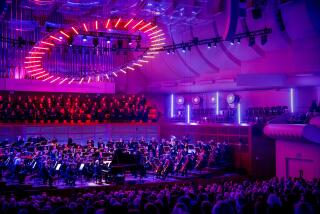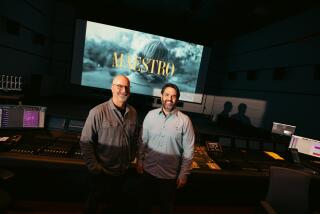‘Stanley Kubrick’s Sound Odyssey’ takes audience on an adventure through the auteur’s classical selections
Stanley Kubrick loved classical music. And by boldly, even provocatively laying pieces from the repertoire — from ancient to avant-garde — against his visual narratives, he recontextualized many of them for all time. Few people now hear “Also sprach Zarathustra” or “The Blue Danube Waltz” without thinking of Kubrick’s indelible imagery.
“I knew that was, of course, Stanley’s strong point, and that he was brilliant at picking great classical pieces,” said Malcolm McDowell, who played the lecherous lad in Kubrick’s 1971 satire, “A Clockwork Orange.” “I never could really quite work it out whether it was because he was too cheap to hire a musical writer to do original music — but I think, obviously, that using classical pieces evokes so much.”
McDowell will host the concert “Stanley Kubrick’s Sound Odyssey” this week at Walt Disney Concert Hall. Conducted by Jessica Cottis, an Australian with film-themed concert experience, the program will pair film clips with a live performance by the L.A. Philharmonic and L.A. Master Chorale in a montage of some of the best-known classical selections employed by the maverick filmmaker.
Kubrick was a casual drummer himself, and had heaping stacks of records and turntables sprawled all over his house in England — music constantly blasting down the halls. If he could have scored the films himself, he would have.
“He was very sad that he hadn’t practiced the piano more, and very sad that he didn’t know more,” said his widow, Christiane Kubrick. “He yearned to know more.”
Kubrick’s first and perhaps consummate foray into classical “needle-drop” scoring was “2001: A Space Odyssey” — even though he initially hired a film composer for the 1968 sci-fi opus: Alex North, who wrote the jagged, neo-romantic score for Kubrick’s prior hit, “Spartacus.” North scored the first 40 minutes of “2001” — but in one of the most legendary horror stories for film composers, when he showed up for the studio screening he saw a film soundtracked exclusively with dead composers.
“Kubrick never called him, never apologized,” recalled Stephen North, the composer’s son. He believes that his father was convinced Kubrick never really wanted a fresh score to begin with, and was married to his “temp track” of classical pieces, but was forced to pretend he did it to satisfy MGM. The two men never spoke again.
The ultimate soundtrack made striking use of Richard Strauss’ “Zarathustra,” Johann Strauss’ “Blue Danube,” Aram Khachaturian’s “Gayane” — and unfamiliar new work by Hungarian composer György Ligeti. Christiane Kubrick heard the Holocaust survivor’s “Requiem” on BBC Radio, and ran into her husband’s in-house cutting room to tell him: “That’s what you have been looking for!” He ended up using four pieces by the composer.
In a strange reverse of North’s experience, Ligeti showed up to a screening of this buzzed-about film at a theater in suburban Hamburg — and was astonished to hear his music throughout. Kubrick hadn’t asked for permission.
“My father had no issue with the quality of Kubrick’s films — in fact, he liked them very much,” said Lukas Ligeti, a composer himself and professor at UC Irvine.
Still, Ligeti felt cheated and hired a lawyer who threatened to sue MGM. The studio instead offered a settlement, which the composer took. “It was an amount that was very, very little for what it should have been,” said Lukas, “but sounded like a lot to my father, who did not have that much money. For the rest of my father’s life, he was sometimes asked about this, and my father always said, ‘Yes, it was really taken without permission.’”
He continued: “Occasionally Kubrick would contact my father, threatening to sue him for libel if he didn’t stop saying that. And my father said, well, he’s not going to stop saying that, because it was true. My father had the highest respect for Kubrick as a film director, but found him a little bit annoying that he occasionally threatened to sue for libel. But he never did.”
Of course, “2001” dramatically increased Ligeti’s fame, particularly in the U.S. When Kubrick used more of the composer’s music in “The Shining” and again in “Eyes Wide Shut,” he compensated Ligeti well.
The dreadful atmosphere of “The Shining,” Kubrick’s very loose 1980 adaptation of the Stephen King novel, was also greatly aided by the music of Krzysztof Penderecki. In works like “Canon for String Orchestra and Tape” and “Utrenja No. 2,” the modernist Polish composer’s penchant for aleatoric, clustered, unsettling tones made a perfect match for the director’s terrifying haunted hotel.
Perhaps the most “natural” employment of classical music was in “Barry Lyndon,” Kubrick’s 1975 drama set in 18th century England. Works such as Handel’s Harpsichord Suite in D minor, Schubert’s Piano Trio in E-flat Major and Bach’s Concerto for Two Harpsichords felt right at home — the pop music of Lyndon’s world.
The mysterious, masked cult that seduces and then ensnares Tom Cruise in “Eyes Wide Shut” was made all the more sinister by the cat-on-piano creepiness of Ligeti’s “Musica Ricercata No. 2.” Ligeti attended the premiere of the film, which was completed after the director’s death, accompanying Christiane Kubrick.
And then there’s “A Clockwork Orange.” The brash, libidinous story of a gang of young men wreaking havoc in a future London ironically paired scenes of debauchery and rape to Beethoven’s uplifting “Symphony No. 9” and Rossini’s whimsical opera, “La gazza ladra.” The idea for using the former came from Anthony Burgess’ novel, but the rest was pure Kubrick.
“People think that music was written for the movie, which is sort of amazing,” said McDowell, whose own relationship to the film has evolved over time. “People would say, ‘Oh yeah, Malcolm ‘Clockwork Orange’ McDowell.’ I’m brought up in the tradition of the English theater, where we play a variety of roles — it’s not just one thing. That perturbed me somewhat, and I didn’t enjoy the film for the first 10 years, maybe, after it came out. But now I am thrilled, beyond belief, that I did it. I’m very happy.”
As for McDowell’s slightly cheeky musing, was Kubrick too cheap to hire composers on these films? Of course not. Licensing existing music and paying royalties isn’t cheap, either. But the actual reason for his collagist use of the repertoire has different answers. Some say it was all about control, about the role of music mattering so much to the almost pathologically perfectionist director that he couldn’t bear to delegate it to another artist.
Christiane Kubrick has a slightly different take. She said her husband would have loved to use original scores, but only if the composer had a year or more to develop them — an impossibility in most post-production schedules.
“He would have often liked to spend much more time choosing and rejecting and so on,” she said. “So if he had found a piece on the radio or wherever, whether it was classical or modern, he said: ‘Well, at least I know this one goes.’”
“Far be it from me to contradict Christiane,” said Jan Harlan, her brother and Kubrick’s longtime producer, “but my experience is that Stanley was guided by what he loved — not just liked, but passionately loved. ‘Good is the enemy of great.’”
“Stanley Kubrick’s Sound Odyssey”
When: 8 p.m. Friday and Saturday, 2 p.m. Sunday
Where: Walt Disney Concert Hall, 111 S. Grand Ave., Los Angeles
Price: $68-$207
Info: laphil.com
More to Read
The biggest entertainment stories
Get our big stories about Hollywood, film, television, music, arts, culture and more right in your inbox as soon as they publish.
You may occasionally receive promotional content from the Los Angeles Times.





